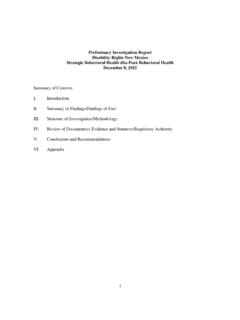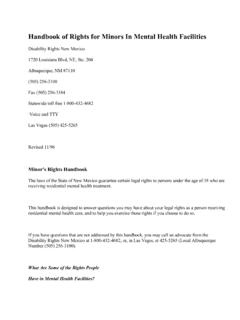Transcription of DISABILITY ISSUES IN THE 2016 LEGISLATURE …
1 DISABILITY ISSUES IN THE 2016 LEGISLATURE status report #4 Jim Jackson, Executive Director DISABILITY Rights New mexico February 15, 2016 Down to the last few days. This year s 30-day legislative session ends at noon this Thursday, Feb. 18. So far, only a handful of bills have passed both the House and the Senate. Action or inaction in these last four days will determine the fate of any bills that are still moving through the process. It now appears that an agreement has been reached on two of this year s most contentious ISSUES : a two-tiered system of driver s licenses/permit cards and a proposed constitutional amendment on conditions of bail for persons facing criminal charges. Most of the other hot button ISSUES are unlikely to be passed. For the many other less controversial bills still in play, it will mostly be a question of whether they get scheduled for committee hearings and final votes in the House or Senate before the constitutionally mandated adjournment at noon on Thursday.
2 A few DISABILITY bills are still in play. Many of the bills tracked in this report call for new funding or tax credits, and no such bills are moving in this session. Some substantive bills, such as a prohibition on seclusion or restraint in public schools and the addition of homelessness to the hate crimes law, have been tabled in committee and are dead for the session. Others are far behind in the legislative process and thus unlikely to get through. Those bills that have passed one chamber, and thus have the best chance for passage, include: HB 61 Savings accounts for persons with disabilities awaiting final Senate vote HB 205 Moving DVR to Workforce Solutions Department SEC/SJC SB 21 Brittany alerts for missing persons with developmental disabilities HJC SB 36 DD waiver waiting list report HHC/HAFC SB 113 Mandated outpatient treatment HJC SB 137 Brain injury protection for student athletes awaiting House committee assignments SB 331 Reporting MI adjudications to FBI data base HJC Further revenue drop drives budget crisis.
3 As the 30-day legislative session nears its end, a new state revenue projection puts the state into a potential deficit situation for the current fiscal year as well as the coming year. In response to the immediate need, the Senate Finance Committee is proposing small across-the-board budget cuts for most state agencies in the current year. Since that year ends this June 30, agencies will have very little time to implement those reductions. 2 For the coming year, beginning July 1, the SFC version of the state budget now amounts to a net spending reduction of $7 million compared to the current year. Most state agencies will see flat budgets or small decreases. A few state agencies will see small increases for certain programs or initiatives. Medicaid, for example, will see an increase of $20 million. Since HSD predicted at the start of the session that it would need $85 million to sustain the program, this budget will require significant cost-cutting measures that will include but may not be limited to reductions in the rates paid to managed care companies as well as doctors, hospitals and other providers.
4 HSD is directed under the bill to seek federal permission to impose monthly premiums and co-pays. Benefit cuts may also be implemented. While some Democratic lawmakers are backing measures that would increase revenues by deferring implementation of tax cuts or by increasing taxes, the governor and her Republican allies are holding firm to her pledge not to raise taxes. The prospect of additional revenues to compensate for the drop in tax income linked to the oil and gas industry thus seems highly unlikely. Conflict over germaneness delays DD waiver bill. A dispute over germaneness that erupted between the House and the Senate threatened to sink SB 36, the bill calling for DOH to report annually on the DD waiver and waitlist. Traditionally, each chamber has determined whether bills introduced by its members are germane and therefore can be considered in a 30-day session. Once those determinations are made, the decision stands, even if the bill is amended during the process, and even after the bill crosses over to the other chamber.
5 In a startling break with that tradition, the Republican leadership in the House referred several Senate bills to its Rules Committee, signaling that it did not accept the Senate's determination as to germaneness. SB 36, from which the appropriation had been stripped, got caught up in the clash and was temporarily barred from moving forward. Fortunately, the House and Senate leadership were able to resolve the matter and the Senate bills, including SB 36, were released from HRC and sent on to other House committees for action. Unfortunately, this delayed the bill at a time when every remaining day is needed to get through the legislative process. Bills and Memorials in the 2016 Legislative Session This list is grouped by DISABILITY or subject matter and shows the bill or memorial number, sponsor, a description and the current committee assignments or action taken. See page 8 for a list of abbreviations used in this section.
6 If bills in the list below are now in the Senate Finance Committee (SFC) or the House Appropriations and Finance Committee (HAFC), they have virtually no chance of moving forward in this year s session because of the budget crisis. Bills which are listed as currently in the House Rules Committee (HRC) or the Senate Committees Committee (SCC) have not been found to be germane to this short session and will not be acted on this year. The state budget HB 2 General Appropriations Act. Rep. Larry Larra aga. This is the state budget bill, providing funding for all state agencies for the year beginning July 1, 2016 , which is referred to as Fiscal Year 2017. Due to the deteriorating revenue projections, the Senate Finance Committee has just made significant changes to the version passed by the House, including reductions in the budgets of some state agencies for the current year (FY 16). Instead of an $81 million increase in state spending in the coming year, as approved by the House a little over a week ago, this version of the budget provides for 3a net reduction in state spending of about $7 million.
7 The SFC s recommendations will now be presented to the Senate for action. Autism SB 62 Autism Funding and EPSDT. Sen. Nancy Rodriguez. Requires HSD to assure that every child with a diagnosis of autism spectrum disorder have access to Medicaid EPSDT screening and services. The bill would also appropriate a total of $ million to the Department of Health and the Public Education Department for various programs and services for individuals with autism. SFC. SB 112 Autism Center at NMSU. Sen. Mary Kay Papen. Appropriates $359,000 to New mexico State University to establish an Autism Research, Testing, Training and Intervention Center. SFC. Behavioral Health/Mental Health HB 51 Gun Show Sales and Reporting MI Determinations. Rep. Miguel Garcia. Regulates the sale of guns at gun shows but also requires the state to report court findings of mental illness to federal authorities for purposes of maintaining the federal data base of those who are prohibited from buying guns.
8 The bill provides for confidentiality of the data transmitted and opportunities to re-establish eligibility to purchase guns. HRC. HB 88 Housing for the Homeless. Rep. Tomas Salazar. Appropriates $ million to HSD for supportive housing, case management, skills training and other services to provide permanent housing for persons who are homeless, or at serious risk of homelessness, and who are mentally ill. This proposal would implement one of the key recommendations from the SJM 4 Task Force, which looked at alternatives to jail for persons with mental illness. HAFC. HB 193 Limiting Solitary Confinement. Rep. Antonio Maestas. Prohibits the use of solitary confinement in detention or correctional facilities for individuals under 18 and for pregnant women. It would extend this prohibition, beginning in July 2017, to persons with a known serious mental illness. Identical to SB 140, below. HRC. HB 197 Infant Mental Health Services.
9 Rep. Don Tripp. This bill by the Speaker of the House appropriates $100,000 to CYFD to contract for the provision of infant mental health services. HAFC. HB 198 Mandated Outpatient Treatment. Rep. Paul Pacheco. Identical to SB 113, described below. HRC. HB 246 Services to Reduce Incarceration. Rep. Sheryl Williams Stapleton. Appropriates $250,000 to HSD to provide services, such as supportive housing, behavioral health therapy and employment training to non-violent juveniles and adults with behavioral health ISSUES in order to reduce incarceration or detention. HAFC. HB 287 Behavioral Health Services for Veterans, Homeless. Rep. Idalia Lechuga-Tena. This bill appropriates $2 million to HSD to provide behavioral health services to veterans and homeless individuals statewide. HAFC. SB 24 EPSDT Screening Requirements. Sen. Jerry Ortiz y Pino. Requires HSD to issue regulations to ensure that all children on Medicaid get screened by age 5 for behavioral health, developmental disabilities and substance abuse.
10 HSD would have to establish a schedule for such screenings to take place. SCC. SB 26 School Based Health Services. Sen. Jerry Ortiz y Pino. Appropriates $550,000 to the Department of Health for school-based health services, including behavioral health. SFC. SB 66 Behavioral Health Training for EMTs. Sen. Jerry Ortiz y Pino. Appropriates $100,000 to the Department of Health to provide behavioral health training to Emergency Medical Technicians (EMTs) around the state. SFC. 4 SB 67 Behavioral Health Apprenticeships. Sen. Jerry Ortiz y Pino. Provides $500,000 to NM Highlands University to create a program through which individuals, especially those from minority backgrounds, would serve as apprentices in behavioral health service agencies. The apprentices and the agencies they work for would provide behavioral health services to low-income individuals. SFC. SB 113 Mandated Outpatient Treatment. Senator Mary Kay Papen.



